Description
The rise of international terrorism in today's globalized world has focused attention on the degree to which international law should shape U.S. national security law and policy. This unique textbook of readings explores how international law relates to U.S. constitutional and statutory law in terms of the right to wage war, the law of armed conflict, combatant status, interrogation of detainees, military commissions, covert action, targeted killing, electronic surveillance, and cyber war. Each chapter is composed of a chronological set of core readings followed by a set of provocative questions, with commentary linking one reading to the next. Written in a lively and engaging manner, U.S. National Security Law makes challenging subject matter accessible for undergraduate students outside of a law school classroom.
This text examines U.S. national security policy making through the lens of international law. The chapters consist of selected excerpts of primary readings to address the question of whether Congress and the President should conform their laws, policies, and actions to the dictates of international law regardless of the nature of the threat.
For those trying to understand the complicated development of national security law, this book may represent the perfect means. Each chapter combines the substantive heft of primary documents with narrative explanation whose easy exposition disguises impressive erudition. In short, Pohlman has gracefully translated the courtroom to the classroom.--Andrew Rudalevige, Bowdoin College
H. L. Pohlman's U.S. National Security Law is a comprehensive, clear, and engaging approach to an important aspect of foreign policy. The volume deftly integrates legal analysis with political realities, and nicely situates the United States's legal and political issues within the broader international legal and political environments.--Matthew Zierler, James Madison College
Pohlman highlights the importance of U.S. national security in today¹s turbulent world, but he does so without losing sight of the fundamental fact that civil liberties and human rights are legal principles at the core of what America stands for.--Nadine Strossen, John Marshall Harlan II Professor of Law, New York Law School and Former President, American Civil Liberties Union, 1991-2008
This text examines U.S. national security policy making through the lens of international law. The chapters consist of selected excerpts of primary readings to address the question of whether Congress and the President should conform their laws, policies, and actions to the dictates of international law regardless of the nature of the threat.
For those trying to understand the complicated development of national security law, this book may represent the perfect means. Each chapter combines the substantive heft of primary documents with narrative explanation whose easy exposition disguises impressive erudition. In short, Pohlman has gracefully translated the courtroom to the classroom.--Andrew Rudalevige, Bowdoin College
H. L. Pohlman's U.S. National Security Law is a comprehensive, clear, and engaging approach to an important aspect of foreign policy. The volume deftly integrates legal analysis with political realities, and nicely situates the United States's legal and political issues within the broader international legal and political environments.--Matthew Zierler, James Madison College
Pohlman highlights the importance of U.S. national security in today¹s turbulent world, but he does so without losing sight of the fundamental fact that civil liberties and human rights are legal principles at the core of what America stands for.--Nadine Strossen, John Marshall Harlan II Professor of Law, New York Law School and Former President, American Civil Liberties Union, 1991-2008
Last updated on
Product Details
- Rowman & Littlefield Brand
- Jul 12, 2018 Pub Date:
- 1538104032 ISBN-10:
- 9781538104033 ISBN-13:
- 352 Pages
- 9.9 in * 7 in * 0.9 in Dimensions:
- 1 lb Weight:




